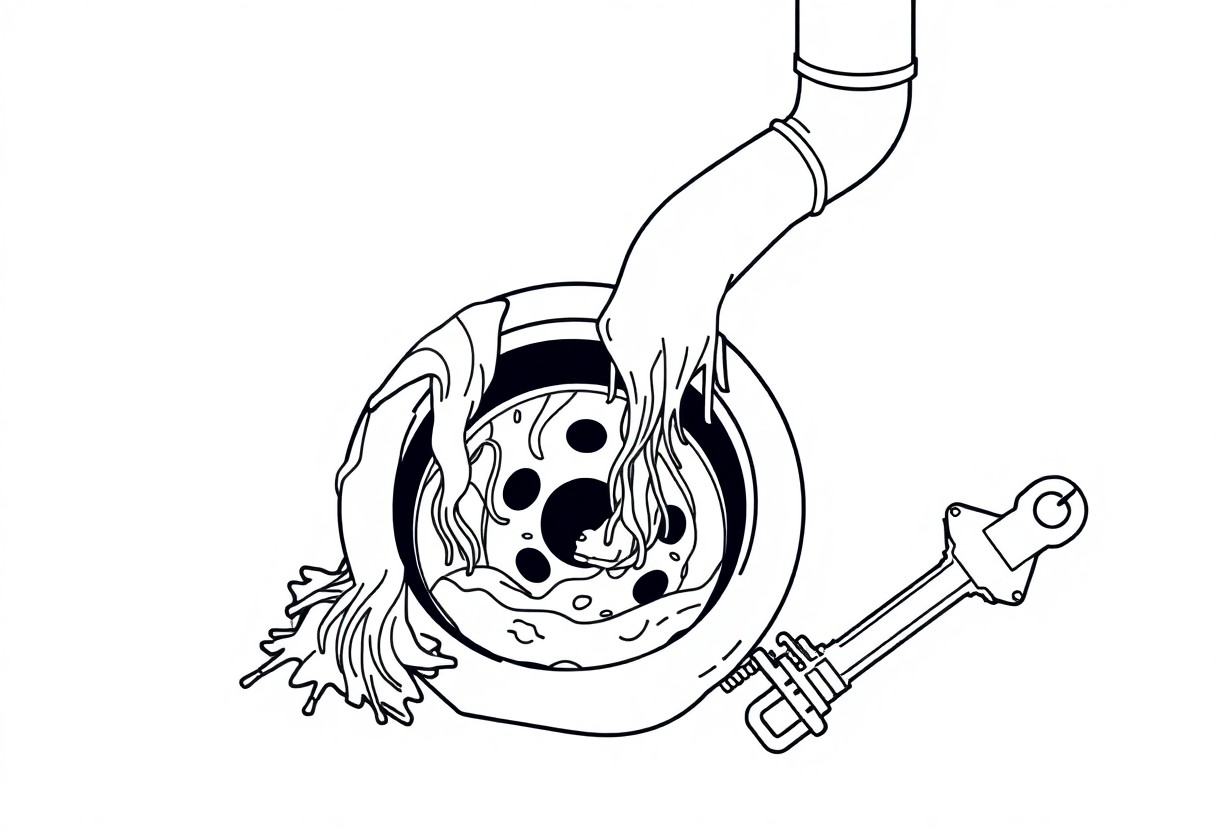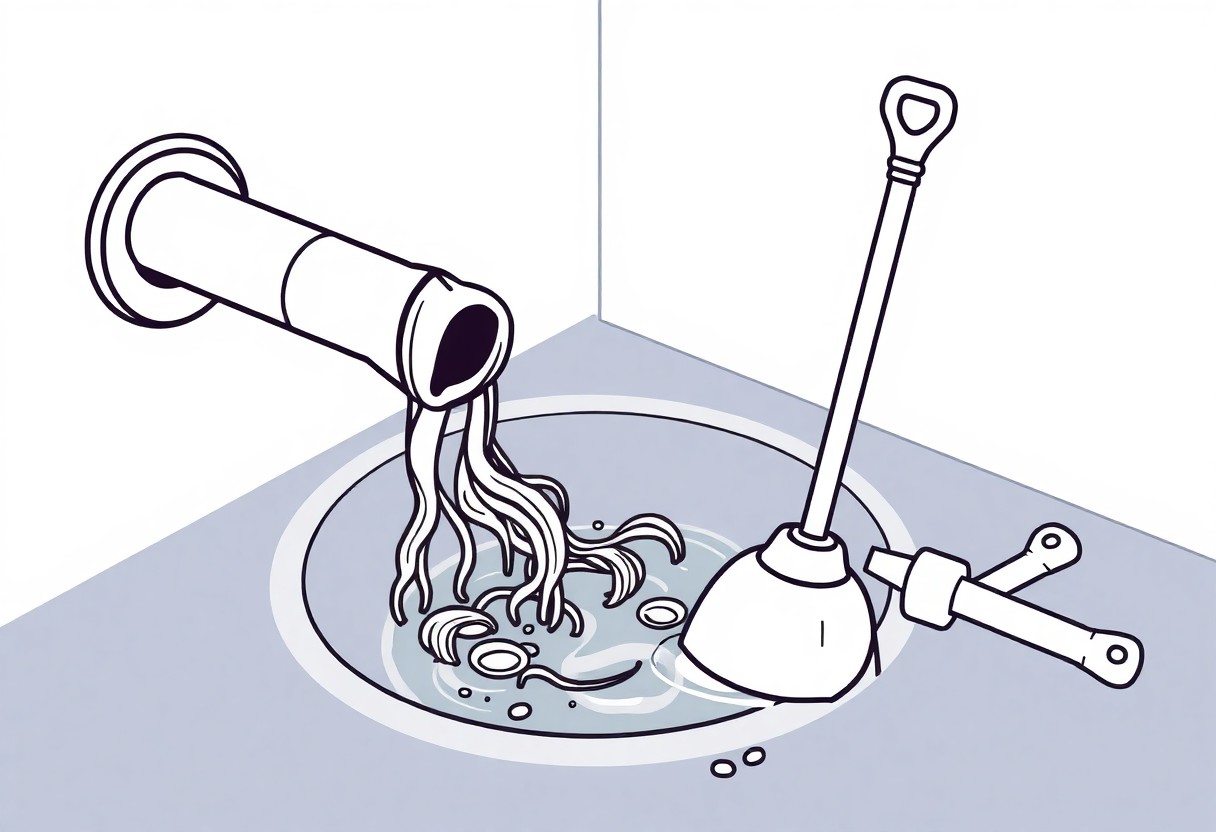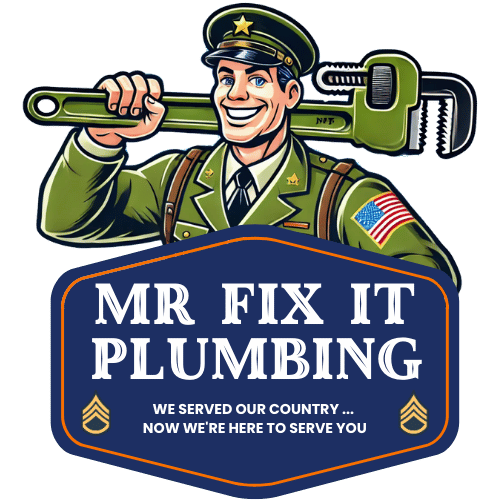Just when you think you’ve tackled the issue, your drains keep clogging, causing frustration and potential damage to your plumbing. You may not realize that common household habits, such as flushing inappropriate items or allowing grease to flow down your sink, can seriously contribute to these blockages. Understanding why your drains keep failing can save you from expensive repairs and unpleasant odors. By taking proactive steps to maintain your plumbing system, you can ensure your drains flow smoothly, making your home a healthier and more comfortable place to live.
Key Takeaways:
- Your drains can clog due to the buildup of hair, soap scum, and grease, which accumulate over time and restrict water flow.
- Flushing inappropriate items such as wipes, paper towels, or food scraps can quickly lead to serious blockages in your plumbing system.
- Regular maintenance, like cleaning drains and using strainers, can help prevent frequent clogging and extend the lifespan of your plumbing.
Common Causes of Clogged Drains
Before you panic about your clogged drains, it’s important to understand the common causes that often lead to blockages. Many homeowners unknowingly contribute to the issues by allowing various materials to accumulate, which can result in stubborn clogs. Identifying these causes will help you take proactive steps to prevent future drainage problems.
Hair and Debris Buildup
Debris such as hair, soap residue, and other organic materials can easily accumulate over time. When these materials combine, they create a thick mass that traps additional waste, leading to significant clogs. Regular maintenance, like using drain covers, can help reduce this buildup and keep your drains flowing smoothly.
Grease and Food Particles
Particles from oils and food waste can create an obstructive layer in your pipes. When grease cools down, it solidifies and sticks to the interior of your plumbing, trapping food scraps and other debris. This can result in serious drainage issues that require professional attention.
Considering the various types of grease and food particles you wash down your sink, it’s easy to see why this is a common issue. Even small amounts can build up over time, leading to major clogs. Be aware that hot water may temporarily dissolve grease, but it won’t eliminate the underlying problem. It’s best to avoid pouring oils and large food scraps down the drain entirely and use waste disposal methods instead, as this can significantly reduce your likelihood of facing future blockages.
Impact of Poor Drain Maintenance
The lack of proper drain maintenance can lead to a cascade of issues in your plumbing system. Over time, accumulated debris, grease, and tree roots can cause serious blockages, resulting in costly repairs and potential property damage. Additionally, neglected drains can foster unpleasant odors and attract unwanted pests, creating an unhealthy environment in your home. Regularly attending to your drains ensures they function efficiently, ultimately saving you time and money.
Signs of Clogged Drains
Before a minor issue escalates into a significant problem, you should be aware of the signs of clogged drains. Common indicators include slow drainage, gurgling noises, and foul odors emanating from your sinks or tubs. If you notice any of these symptoms, it’s important to take action quickly to prevent a more severe blockage from forming.
Long-term Consequences
An ongoing lack of drain maintenance can lead to extensive damage that affects both your plumbing and your home.
It’s important to understand that if you ignore these problems, you risk serious plumbing issues, which can lead to extensive water damage and create a favorable environment for mold growth. These long-term consequences not only threaten your home’s structural integrity but also your family’s health. Addressing clogged drains promptly helps prevent these risks, ensuring your plumbing system remains in good condition and your living environment stays safe.

Preventative Measures
For effective drain maintenance, taking preventative measures can save you from frequent clogs and costly repairs. Regularly inspecting your drains, using drain covers, and being mindful of what goes down your sinks can significantly reduce the likelihood of blockages. Additionally, ensuring your plumbing system is up to date will help you avoid the buildup of debris, grease, and other materials that contribute to clogs, keeping your drains clear.
Regular Cleaning Techniques
Techniques for routine cleaning of your drains include using a mixture of baking soda and vinegar to clear debris and odors. Pouring boiling water down your drains on a regular basis can also help dissolve any grease build-up. A monthly cleaning regimen will keep your pipes running smoothly, preventing potential clogs before they occur.
Proper Disposal Practices
Behind every clogged drain lies improper disposal practices. Make sure you are disposing of items that could cause blockages, such as oils, fats, and food scraps, in the right way. Avoid flushing any items other than toilet paper, and always use a compost or trash bin for waste. This small shift can lead to a significant reduction in clogs.
At home, it is important to be mindful of the items you discard down your sinks and toilets. Flushing non-biodegradable materials like wipes, cotton balls, or feminine hygiene products can lead to serious plumbing issues. Additionally, pouring grease down the drain not only contributes to blockages but can also solidify and create a much larger issue within your plumbing system. By adopting proper disposal practices, you can enhance the longevity of your plumbing and prevent costly repairs.

Tools and Products for Drain Maintenance
Keep your drains flowing smoothly by utilizing effective tools and products designed for drain maintenance. From drain snakes to plungers, having the right equipment on hand can help you tackle minor clogs before they escalate. In addition, consider using environmentally friendly drain cleaners that can break down buildup without harming your plumbing or the environment. Regular maintenance with these tools can save you time and costly repairs in the long run.
Professional Drain Cleaning Services
Tools used by professionals can often tackle issues beyond the reach of DIY methods. When you experience persistent clogging, enlisting the help of experts ensures a thorough cleaning, utilizing equipment such as hydro-jetters that eliminate stubborn blockages. This is particularly beneficial in homes with older plumbing systems or when dealing with extensive buildup.
DIY Solutions and Tools
Behind many minor plumbing problems lies a set of simple DIY tools and solutions you can integrate into your home maintenance routine. Having a trusty plunger, drain snake, or a bottle of baking soda and vinegar can help you address everyday clogs effectively.
Drain clogs can often be tackled with basic items you might already have at home. Using baking soda and vinegar can create a natural fizzing reaction that helps to clear minor buildups. A plunger is great for removing blockages close to the surface, while a drain snake can reach deeper into the pipes. Just ensure that you avoid using harsh chemical cleaners as they can damage your plumbing and pose serious health risks if mishandled. By taking a proactive approach with these tools, you can maintain your drainage system effectively.
When to Seek Professional Help
Not every drainage issue can be solved with a plunger or DIY methods. If you notice frequent clogs, slow drainage, or unpleasant odors that persist despite your efforts, it’s time to seek professional help. A plumber can diagnose underlying issues, preventing further damage and ensuring the longevity of your plumbing system.
Identifying Severe Clogs
Across your home, severe clogs can manifest as recurring backups, gurgling sounds from your drains, or water pooling in your sinks and tubs. If you’ve tried conventional remedies without success, it’s a clear sign that the blockage may be deeper in your pipes and requires expert intervention.
Avoiding Costly Repairs
Severe clogs can lead to extensive plumbing issues if left unattended. Ignoring minor drainage problems may cause backups that can damage your plumbing and property. To avoid unhealthy situations, make it a habit to inspect your drains regularly and remove any visible obstructions.
Another important aspect to consider is that promptly addressing minor clogs can save you from expensive repairs down the line. Regularly cleaning your drains and using preventative measures can help you maintain a healthy plumbing system. Additionally, consulting a professional when problems arise can significantly reduce the risk of major repairs, ensuring peace of mind and a smooth flow of water throughout your home.
Final Words
So, if your drains keep clogging, it’s necessary to assess what might be causing these blockages in your home. You may be dealing with buildup from hair, grease, or soap residue, which can accumulate over time. It’s also possible that tree roots or structural issues are contributing to the problem. Regular maintenance, careful disposal of waste, and timely attention to leaks can significantly reduce the frequency of clogs. By taking proactive steps and being mindful of what goes down your drains, you can keep your plumbing running smoothly.
Q: What are the common causes of clogged drains?
A: Clogged drains can be caused by various factors. Some of the most common include the accumulation of hair, soap scum, food particles, grease, and foreign objects. In bathrooms, hair and soap residue can build up over time. In kitchens, grease and food waste often lead to clogs. Additionally, tree roots invading sewer lines can also be a significant contributing factor.
Q: How can I prevent my drains from clogging?
A: To prevent clogs, there are several steps you can take. In the kitchen, avoid pouring grease down the sink and use a strainer to catch food particles. In the bathroom, regular cleaning and using drain covers can help minimize hair buildup. Additionally, periodically flushing your drains with hot water or vinegar and baking soda can keep them clear of debris.
Q: What should I do if my drain is already clogged?
A: If your drain is clogged, try using a plunger to dislodge the blockage. If that doesn’t work, you can attempt to use a drain snake or a mixture of vinegar and baking soda to break down any buildup. In cases where these methods fail, it may be time to call a professional plumber to assess and resolve the issue effectively.
Q: Are chemical drain cleaners safe to use?
A: While chemical drain cleaners can offer a quick fix for minor clogs, they can also be harmful to your plumbing and the environment. These substances can eat away at pipes over time and pose health risks if not used properly. It’s advisable to utilize natural alternatives or consult a professional for a safe and effective solution.
Q: How often should I maintain my drains?
A: Regular maintenance of your drains is recommended to prevent clogs. You should conduct a thorough cleaning at least once every few months. However, if you frequently experience issues, more frequent checks and cleanings may be necessary. Keeping an eye on signs of slow drainage or unusual odors can also help catch potential problems early.

